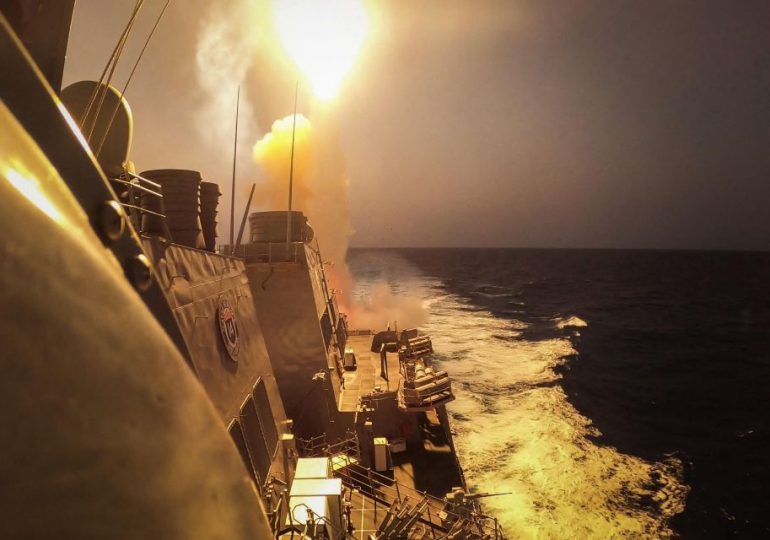GUN-toting rebels have turned a vital shipping lane into a war zone amid a surge in attacks on passing vessels.
Yemen‘s Iran-backed Houthi rebels have unleashed chaos in the Red Sea by blasting ships and patrolling waters on speedboats ready to hijack.
AFPUSS Carney defeating a combination of Houthi missiles and unmanned aerial vehicles in the Red Sea in October[/caption]
AlamyHouthi rebels are an Iran-backed militia group in Yemen[/caption]
GettyIn November, an Israeli-owned ship was ambushed by Iran-backed Houthi rebels who stormed the deck with guns[/caption]
The Houthis control Yemen and its west coast along the Red Sea – and Iran is understood to actively arm the group.
They vowed to target all ships owned by Israel or flying the country’s flag in the Red Sea in the wake of Hamas‘ horror October 7 massacre.
The group declared themselves part of the “axis of resistance” of Iran’s allies and proxies and have rallied behind the Palestinians since Hamas attacked Israel.
In October, Houthi military spokesman Yahya Saree said in a televised statement the group had launched a “large number” of ballistic missiles and drones towards Israel.
Saree insisted there would be more such attacks to come “to help the Palestinians to victory”.
And since the October 7 massacre almost two months ago, there has been a chilling spike in the number of incidents in the inlet.
The Houthis have launched a series of drones and missiles toward Israel in recent weeks as well as blasting ships and seizing a cargo vessel in the last month.
Shipping officials have warned commercial vessels face increasing dangers as the threat of hijacking and missile blasts loom.
Analysts suggest the Houthis hope to shore up waning popular support after years of civil war in Yemen between it and Saudi-backed forces.
Houthi leader Abdulmalik al-Houthi threatened to seize shipping in a rant last month.
He said: “Our eyes are open to constantly monitor and search for any Israeli ship in the Red Sea.”
But the Houthi involvement stokes fears that the war in Gaza could spiral out into the wider Middle East.
In November, the Houthis seized a vehicle transport ship linked to Israel, the Galaxy Leader, in the Red Sea off Yemen.
The rebels still hold the vessel near the port city of Hodeida.
Meanwhile, missiles landed near a US warship last week after it assisted a vessel linked to Israel that had briefly been seized by gunmen.
In the most recent attack on Sunday, the US Navy was forced to go to the rescue of three ships being ambushed in the Red Sea.
A British merchant ship was among the trio Houthis fired ballistic missiles at in what was seen as a major escalation in maritime attacks in Middle Eastern waters.
As the vessels were blasted in the hours-long assault, a US warship shot down three drones in self-defense.
The USS Carney, a Navy destroyer, detected a ballistic missile fired from Houthi-controlled areas of Yemen at the Bahamas-flagged bulk carrier Unity Explorer.
The missile hit near the ship, the US said. Shortly afterward, the Carney shot down a drone headed its way, although it’s not clear if the destroyer was the target, Central Command said.
About 30 minutes later, the Unity Explorer was hit by a missile.
While responding to its distress call, the Carney shot down another incoming drone.
Central Command said the Unity Explorer sustained minor damage from the missile.
Two other commercial ships, the Panamanian-flagged bulk carriers Number 9 and Sophie II, were both struck by missiles.
The Number 9 reported some damage but no casualties, and the Sophie II reported no significant damage, Central Command said.
While sailing to assist the Sophie II, the Carney shot down another drone heading in its direction. The drones did no damage.
The US now threatened to consider ” all appropriate responses” – specifically calling out Iran after tensions have been high for years now over Tehran’s rapidly advancing nuclear program.
The US military’s Central Command said in a statement. “These attacks represent a direct threat to international commerce and maritime security.
“They have jeopardised the lives of international crews representing multiple countries around the world.
“We also have every reason to believe that these attacks, while launched by the Houthis in Yemen, are fully enabled by Iran.
“The United States will consider all appropriate responses in full coordination with its international allies and partners.”
The Carney, an Arleigh Burke-class guided-missile destroyer, has shot down multiple rockets the Houthis have fired toward Israel during that nation’s war against Hamas in the Gaza Strip.
It hasn’t been damaged in any of the incidents and no injuries have been reported on board.
Houthi military spokesman Brig. Gen. Yahya Saree claimed two of Sunday’s attacks, saying the first vessel was hit by a missile and the second by a drone while in the Bab el-Mandeb Strait, which links the Red Sea to the Gulf of Aden.
Saree said: “The Yemeni armed forces continue to prevent Israeli ships from navigating the Red Sea until the Israeli aggression against our steadfast brothers in the Gaza Strip stops.
“The Yemeni armed forces renew their warning to all Israeli ships or those associated with Israelis that they will become a legitimate target if they violate what is stated in this statement.”
Saree also identified the first vessel as the Unity Explorer, which is owned by a British firm that includes Dan David Ungar, who lives in Israel, as one of its officers.
The Number 9 is linked to Bernhard Schulte Shipmanagement.
The Sophie II’s owner, Kyowa Kisen of Imabari, Japan, told The Associated Press that the ship’s crew were safe and the vessel did not sustain serious damage.
Israeli media identified Ungar as being the son of Israeli shipping billionaire Abraham Rami Ungar.
Iran has yet to directly address the attacks.
Iran has yet to directly address the attacks. However, Iranian Foreign Minister Hossein Amirabdollahian threatened “that if the current situation continues, the region will enter a new phase” over the Israel-Hamas war.
Amirabdollahian said: “All parties who are after igniting a war are warned, before it’s too late stop the killing of women and children, of which a new round has started.”
The US has stopped short of saying its Navy ships were targeted, but has said Houthi drones have headed toward the ships and have been shot down in self-defense.
Washington so far has declined to directly respond to the attacks, as has Israel, whose military continues to try to describe the ships as not having links to their country.
Global shipping had increasingly been targeted as the Israel-Hamas war threatens to become a wider regional conflict even as a truce briefly halted fighting and Hamas exchanged hostages for Palestinian prisoners held by Israel.
However, the collapse of the truce and the resumption of punishing Israeli airstrikes on Gaza and a ground offensive there had raised the risk of more seaborne attacks.
The Houthis had not directly targeted the Americans for some time, further raising the stakes in the growing maritime conflict.
In 2016, the US launched Tomahawk cruise missiles that destroyed three coastal radar sites in Houthi-controlled territory to retaliate for missiles being fired at US Navy ships at the time.
Houthi rebels landed in a chopper to attack the Galaxy Leader ship
GettyThe Galaxy Leader is a large cargo ship owned by an Israeli tycoon[/caption]
Leave a comment
















